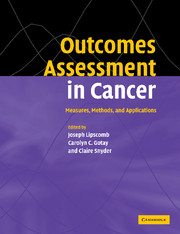Book contents
- Frontmatter
- Contents
- List of contributors
- Acknowledgments
- 1 Introduction to Outcomes Assessment in Cancer
- Health-related quality of life in cancer: general concepts and generic measures
- Assessing health-related quality of life during treatment
- 5 Quality of life in breast cancer: what have we learned and where do we go from here?
- 6 Measuring quality of life in prostate cancer: progress and challenges
- 7 The science of quality-of-life measurement in lung cancer
- 8 Treatment for colorectal cancer: impact on health-related quality of life
- 9 Instruments to measure the specific health impact of surgery, radiation, and chemotherapy on cancer patients
- Assessing health-related quality of life across the cancer continuum
- Measuring the experience and needs of cancer patients and caregivers
- Methodological considerations in applications to cancer outcomes research
- Modern psychometric theory in cancer outcomes research
- Assessing the economic impact of cancer
- Research and policy implications
- Invited papers
- Index
- References
7 - The science of quality-of-life measurement in lung cancer
Published online by Cambridge University Press: 18 December 2009
- Frontmatter
- Contents
- List of contributors
- Acknowledgments
- 1 Introduction to Outcomes Assessment in Cancer
- Health-related quality of life in cancer: general concepts and generic measures
- Assessing health-related quality of life during treatment
- 5 Quality of life in breast cancer: what have we learned and where do we go from here?
- 6 Measuring quality of life in prostate cancer: progress and challenges
- 7 The science of quality-of-life measurement in lung cancer
- 8 Treatment for colorectal cancer: impact on health-related quality of life
- 9 Instruments to measure the specific health impact of surgery, radiation, and chemotherapy on cancer patients
- Assessing health-related quality of life across the cancer continuum
- Measuring the experience and needs of cancer patients and caregivers
- Methodological considerations in applications to cancer outcomes research
- Modern psychometric theory in cancer outcomes research
- Assessing the economic impact of cancer
- Research and policy implications
- Invited papers
- Index
- References
Summary
Introduction
Lung cancer is the leading cause of cancer death in the US. Non-small-cell lung cancer (NSCLC) (squamous, adenocarcinoma, and large cell carcinoma) is responsible for about 75% of these cases, while small cell lung cancer (SCLC) accounts for the other 25%. Most patients present with incurable disease at the time of diagnosis and, because of early hematogenous spread, even those presenting with “early” stage disease will usually eventually develop incurable metastases. The five-year survival rate for all lung cancer patients is only 15% and has not improved significantly over the last 30 years.
Surgery is the only treatment modality that can consistently cure a small number of patients with early NSCLC, although radiation can be curative in some limited circumstances. Chemotherapy may contribute in an adjuvant or neoadjuvant role, but it is mostly used as a palliative therapy for advanced disease. SCLC, on the other hand, is more chemosensitive and can be cured in a minority of patients with chemotherapy and radiation. Nevertheless, most patients relapse and die within one year of diagnosis.
Treatments for all stages and histologies of lung cancer are difficult, expensive, and come with non-trivial toxicity. Because the prognosis is almost uniformly poor despite intervention, many of these therapies are controversial. At presentation, over 80% of lung cancer patients report disease-related symptoms, most commonly cough and dyspnea, as well as systemic effects like fatigue and anorexia and high degrees of psychological distress.
- Type
- Chapter
- Information
- Outcomes Assessment in CancerMeasures, Methods and Applications, pp. 160 - 177Publisher: Cambridge University PressPrint publication year: 2004
References
- 3
- Cited by

